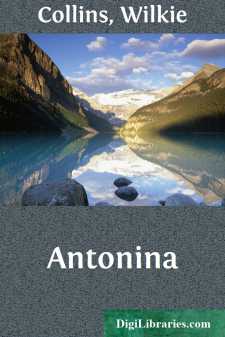Categories
- Antiques & Collectibles 13
- Architecture 36
- Art 48
- Bibles 22
- Biography & Autobiography 813
- Body, Mind & Spirit 142
- Business & Economics 28
- Children's Books 17
- Children's Fiction 14
- Computers 4
- Cooking 94
- Crafts & Hobbies 4
- Drama 346
- Education 46
- Family & Relationships 57
- Fiction 11829
- Games 19
- Gardening 17
- Health & Fitness 34
- History 1377
- House & Home 1
- Humor 147
- Juvenile Fiction 1873
- Juvenile Nonfiction 202
- Language Arts & Disciplines 88
- Law 16
- Literary Collections 686
- Literary Criticism 179
- Mathematics 13
- Medical 41
- Music 40
- Nature 179
- Non-Classifiable 1768
- Performing Arts 7
- Periodicals 1453
- Philosophy 64
- Photography 2
- Poetry 896
- Political Science 203
- Psychology 42
- Reference 154
- Religion 513
- Science 126
- Self-Help 84
- Social Science 81
- Sports & Recreation 34
- Study Aids 3
- Technology & Engineering 59
- Transportation 23
- Travel 463
- True Crime 29
Antonina
by: Wilkie Collins
Categories:
Description:
Excerpt
CHAPTER 1.
The mountains forming the range of Alps which border on the north-eastern confines of Italy, were, in the autumn of the year 408, already furrowed in numerous directions by the tracks of the invading forces of those northern nations generally comprised under the appellation of Goths.
In some places these tracks were denoted on either side by fallen trees, and occasionally assumed, when half obliterated by the ravages of storms, the appearance of desolate and irregular marshes. In other places they were less palpable. Here, the temporary path was entirely hidden by the incursions of a swollen torrent; there, it was faintly perceptible in occasional patches of soft ground, or partly traceable by fragments of abandoned armour, skeletons of horses and men, and remnants of the rude bridges which had once served for passage across a river or transit over a precipice.
Among the rocks of the topmost of the range of mountains immediately overhanging the plains of Italy, and presenting the last barrier to the exertions of a traveller or the march of an invader, there lay, at the beginning of the fifth century, a little lake. Bounded on three sides by precipices, its narrow banks barren of verdure or habitations, and its dark and stagnant waters brightened but rarely by the presence of the lively sunlight, this solitary spot—at all times mournful—presented, on the autumn of the day when our story commences, an aspect of desolation at once dismal to the eye and oppressive to the heart.
It was near noon; but no sun appeared in the heaven. The dull clouds, monotonous in colour and form, hid all beauty in the firmament, and shed heavy darkness on the earth. Dense, stagnant vapours clung to the mountain summits; from the drooping trees dead leaves and rotten branches sunk, at intervals, on the oozy soil, or whirled over the gloomy precipice; and a small steady rain fell, slow and unintermitting, upon the deserts around. Standing upon the path which armies had once trodden, and which armies were still destined to tread, and looking towards the solitary lake, you heard, at first, no sound but the regular dripping of the rain-drops from rock to rock; you saw no prospect but the motionless waters at your feet, and the dusky crags which shadowed them from above. When, however, impressed by the mysterious loneliness of the place, the eye grew more penetrating and the ear more attentive, a cavern became apparent in the precipices round the lake; and, in the intervals of the heavy rain-drops, were faintly perceptible the sounds of a human voice.
The mouth of the cavern was partly concealed by a large stone, on which were piled some masses of rotten brushwood, as if for the purpose of protecting any inhabitant it might contain from the coldness of the atmosphere without. Placed at the eastward boundary of the lake, this strange place of refuge commanded a view not only of the rugged path immediately below it, but of a large plot of level ground at a short distance to the west, which overhung a second and lower range of rocks....












